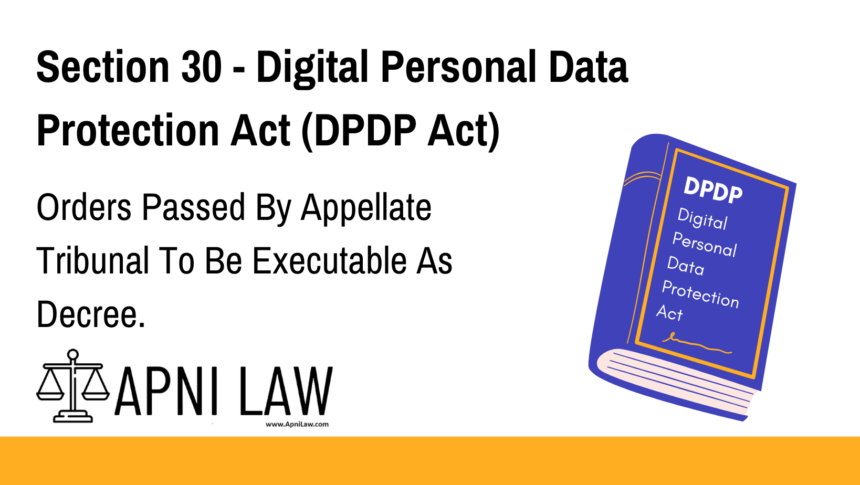Code: Section 30
(1) An order passed by the Appellate Tribunal under this Act shall be executable
by it as a decree of civil court, and for this purpose, the Appellate Tribunal shall have all the
powers of a civil court.
(2) Notwithstanding anything contained in sub-section (1), the Appellate Tribunal
may transmit any order made by it to a civil court having local jurisdiction and such civil
court shall execute the order as if it were a decree made by that court.
Explanation of Section 30 DPDP
Section 30 of the Digital Personal Data Protection Act (DPDP) outlines how the Appellate Tribunal’s orders can be enforced. The section makes these orders executable just like those made by a civil court.
Key Provisions:
- Execution as Civil Court Decree:
The Appellate Tribunal’s orders are treated as civil court decrees. Therefore, it can use the same powers as a civil court to ensure the orders are enforced. - Transmission to Civil Courts for Enforcement:
If necessary, the Appellate Tribunal can send its orders to a civil court with local jurisdiction. The civil court will then enforce the order as if it were its own decree.
Why Section 30 is Important
Section 30 ensures that the Appellate Tribunal’s orders carry legal weight. This means that its decisions are not just advisory but also enforceable through the legal system.
Benefits:
- Ensures Enforcement: The Appellate Tribunal’s decisions are binding, ensuring that any penalties or actions it orders are carried out.
- Improves Accessibility: The ability to transmit orders to local civil courts ensures that the orders are enforced efficiently, even if the Tribunal has no direct jurisdiction over the area.
Example Scenarios
Example 1: Enforcing Penalties for Data Breach
If a company fails to pay a penalty after a data breach, the Appellate Tribunal can enforce its order just like a civil court decree. If needed, the Tribunal can send the order to a local civil court to ensure payment.
Example 2: Enforcing Compliance with Tribunal’s Directions
If the Appellate Tribunal orders a company to change certain practices, and the company refuses, the Tribunal can execute its order as a civil court would, ensuring compliance.
Common Questions About Section 30 DPDP
1. What powers does the Appellate Tribunal have?
The Appellate Tribunal can enforce its orders just like a civil court. It has powers to summon people, seize property, and ensure compliance.
2. What happens if someone doesn’t comply with the Tribunal’s order?
If someone refuses to comply, the Tribunal can send the order to a local civil court for enforcement.
3. Can the Appellate Tribunal execute its own orders?
Yes, the Appellate Tribunal can execute its orders. Alternatively, it can forward the order to a local civil court for enforcement.
Conclusion
Section 30 of the DPDP Act ensures the Appellate Tribunal’s orders are legally binding and enforceable. The provision allows the Tribunal to take action like a civil court, giving its decisions the force of law. Furthermore, the ability to transmit orders to civil courts improves the overall effectiveness of the DPDP Act.
For more information about the DPDP Act and its sections, visit ApniLaw.








